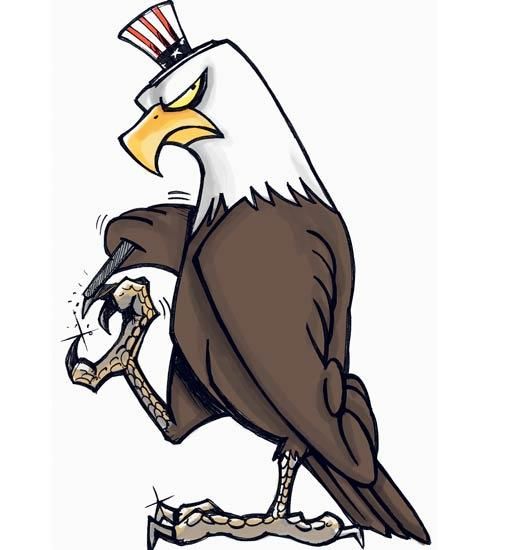Not content with plunging Afghanistan into what could be decades of conflict and triggering a bloodbath in Iraq, it looks as though the US government has Iran firmly in its sights.
Faced with a deepening quagmire in Iraq and Israel's embarrassing failure to defeat Hezbollah last summer, the more hawkish elements of the Bush administration went quiet for a while.
Just a few months ago, signs were the White House had altered course. It was clear the public was in no mood for war and overwhelmingly wanted out of Iraq.
George W. Bush was perceived as a lame duck president limping through his final term with an approval rating of only 29-30 per cent.
It was thought a Democrat-led Congress would clip his wings and prevent him from wreaking further havoc in this part of the world. There was even talk of impeachment.
The gloomy predictions of veteran investigative journalist Seymour Hersh that Iran would be bombed began to be discounted. Various meetings between US and Iranian officials to discuss Iraq's security appeared to some to represent the kernel of a new detente.
Clamours that Iran should quit enriching uranium became subdued after the nuclear watchdog, the IAEA, assured the international community its monitoring and verification of Iran's nuclear facilities was ongoing and there was no proof that Iran was actively pursuing a weapons programme. But just as this region began to collectively sigh with relief, the mood significantly changed.
Recently, Bush publicly rapped Hamid Karzai, the President of Afghanistan, and Iraq's leader Nouri Al Maliki over the knuckles for suggesting Tehran was a positive regional influence, committed to stabilising their respective nations.
Then last week, the Bush administration dramatically upped the ante, hinting it would declare the Iranian Revolutionary Guard - including its elite Quds Force - a "terrorist organisation". This is, in fact, the first time in history that a sovereign state's legitimate military would be thus labelled.
This will have little effect in real terms. Nevertheless, it sends out a strong signal to America's allies to follow suit, else incur Washington's displeasure.
More importantly it pokes Tehran in the eye and begs a reaction. This came on Saturday in the form of a threat by the leader of the Revolutionary Guards Yahya Rahim Safavi to "punch" the US.
A more specific threat came from Ali Razmjoo, a Revolutionary Guards naval commander. "With the power the Guards have obtained now, if the enemies want to ... begin a military confrontation the region will be turned into hell," he said.
The Iranian foreign minister Manouchehr Mottaki has brushed off reports that the Revolutionary Guards are about to join a terrorist blacklist as a "propaganda game". This may be so.
Aerial attack
It could be that the Bush administration is out to intimidate Iran into rolling over. On the other hand, the designation could be a precursor to a massive US aerial attack on Iranian nuclear facilities just as Hersh outlined in his seven-page-long April 17, 2006 New Yorker report "The Iran Plans".
The article's main thrust - formed with the input of numerous lofty insiders - is that the US will never allow Iran to develop a nuclear weapon with which to threaten Israel.
Hersh reinforces the point by quoting a portion of Bush's March 20, 2006 vowing to "use military might" against Iran "to protect our ally Israel". Bush has also stressed the importance of diplomacy but so far we've seen very little evidence of that.
On Sunday, former CIA case officer and author Robert Baer expressed his own views on Al Jazeera. He believes a US air attack on Iran is likely within the next three months and referred to the recent US-Iran bilateral talks as "a smokescreen".
However, last year, Baer indicated that the success of any such US strike would depend on cooperation from allies as well as Russia and China.
As things stand, the US certainly cannot count on Russia or China for support and it's extremely unlikely Britain's Prime Minister Gordon Brown would throw his cap into the ring, especially with a general election in the offing.
There's little doubt, though, that the White House is up to something. Bush's sudden interest in furthering a Palestinian state and his eagerness to arm Israel and Arab allies to the tune of $40 billion are enough to arouse suspicions in even the least sceptical among us.
From Bush's perspective, politically he has little to lose if, indeed, he does intend attacking Iran. Already discredited as a leader, such a move could constitute Bush's last throw of the dice with winner takes all.
Don't expect the Democrats to come to the rescue. Most Democratic presidential hopefuls have been busy sabre-rattling against Tehran as part of their campaigns.
And, as for the American people, they will be persuaded that taking on Iran and its "terrorist" Revolutionary Guard is just another inevitable stage in the "War on Terror". Those of us in the neighbourhood are left wondering "when on earth will they leave us alone?"
Linda S. Heard is a specialist writer on Middle East affairs. She can be contacted at lheard@gulfnews.com. Responses to this article may be considered for publication.











